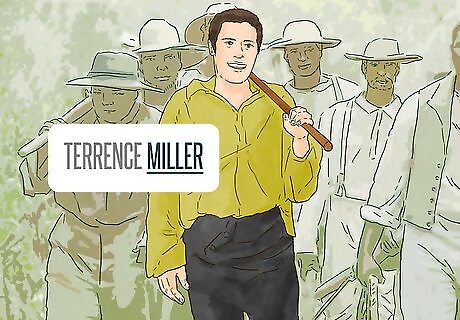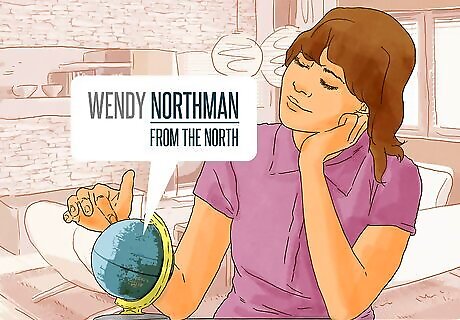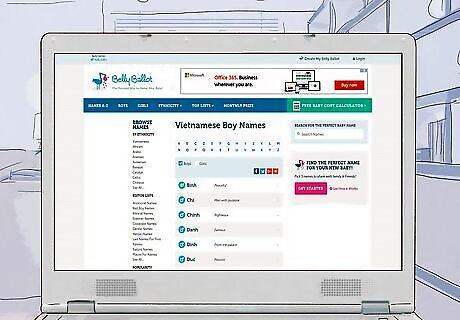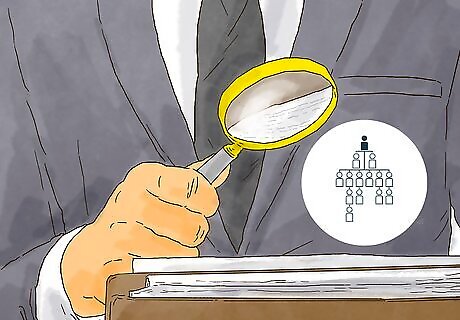
views
Determining if You Have a Family-Related Surname

Look at the prefix in your surname. The prefix is the first two or three letters of your surname. The prefix was often added to notate if the head of your family was the “son of” or the “daughter of” the head of their family. Certain prefixes come from specific places and cultures, such as Gaelic, Irish, and English. Your surname may have prefixes like: “Mac” or “Mc,” such as “MacDonald” or “McCloud.” This means your surname is of Gaelic origin. “Fitz,” such as “Fitzpatrick” or “Fitzgerald.” This means your surname is of English origin. “O,” such as “O’Brien” or “O’Shea.” This means your surname is of Irish origin. “ap,” such as “Bedo ap Batho,” which becomes “Bedo Batho.” This means your surname is of Welsh origin.

Check the suffix in your surname. The suffix is usually the last two to three letters of your surname. The suffix was commonly used to denote when someone is the “son of” or “daughter of” someone. Your surname may have suffixes like: “-son,” such as “Johnson” or “Paulson.” This means your ancestor was likely the son of someone named John or Paul. This likely means your surname is Scottish or British. “-sen,” such as “Andersen.” This is the Scandinavian spelling of “son.” “-ian” or “-yan,” as in “Simonian” or “Petrossyan.” This means your surname is Armenian. “-ski,” such as “Petroffski.” This means your surname is Polish. "-ez" or "-az," such as "Fernandez" or "Diaz." This means your surname is Spanish. "-es" or "os," such as "Morales" or "Rolos." This means your surname is Portuguese.

Note the difference between family surnames and clan names. In North America, it is the standard that people are given surnames based on the names of the head of their family. In other parts of the world, such as Africa, Asia, and parts of Europe, it is more common for people to use a clan name as their surname, where their surname can be traced back to what clan their ancestors belonged to. For example, in Uganda, people’s surnames derive from the clan their ancestors belonged to. So you may have many people with the surname “Buganda,” as their ancestors all belonged to the same clan. In Japan, it is also common for people to be named based on their clan, such as the Fujiwara clan or the Satōs clan. Depending on where your ancestors are from, you may need to trace back your surname to the clan, tribe, or kingdom your ancestors belonged to, rather than using a mother or father’s name as a guide.
Checking if You Have an Occupational or Geographical Surname

Notice if your surname refers to a particular occupation. In some cases, our last name reflects the occupation or status of your ancestors. The occupation was usually a craft or trade during the medieval period in Europe. Look up your surname to see if it relates to a particular occupation. Examples include: “Miller,” a person who would grind flour from grain. It can also be spelt “Muller” if your ancestors were German. “Wainwright,” a person who built wagons. “Bishop,” a person who worked for a Bishop. “Taylor,” a person who made or repaired clothing. “Carter,” a person who made or drove carts. “Alderman,” a person who was an official clerk of the court. “Stewart,” a person who was a steward. "Alcaldo," a person who was a mayor. "Zapatero," a person who was a shoemaker. A list of surnames that relate to the names of occupations can be found here: https://surnames.behindthename.com/names/source/occupation.

Check if your surname can be traced back to a location. Another way last names come about was to distinguish a person based on the location where they lived or were born. Their surname may refer to a particular city, town, or country. This was commonly used in France, England, and other parts of Europe. Examples include: “Parris,” which means your ancestor likely came from Paris, France. “London,” which means your ancestor came from London, England. “Medina,” which means your ancestor came from Medina, Mexico. "Chan," which is a reference to an ancient region in China.

Notice if your surname refers to a landscape. Your surname may reference a geographical feature like a stream, cliff, or forest. It may refer to the fact that your ancestor lived near a mountain or was born near a river. For example: “Brooks,” which means your ancestor lived along a brook. “Churchill,” which means your ancestor lived near a church on a hill. "Vega," or "meadow" in Spanish, which means your ancestor may have lived near a meadow. "Iglesias," or "church" in Spanish, which means your ancestor may have lived near a church. "Takahashi," a Japanese last name which translates to people who lived by or under a tall, high bridge. "Choi," a Chinese last name which translates to people who lived on a pinnacle or peak. "Yamamoto," a Japanese last name that refers to the base of a mountain. "Park," a Korean surname that means "magnolia tree."

Determine if your surname refers to a direction. In some cases, your surname may be derived from the geographical direction where your ancestor lived or is from. Your name may include compass directions like “East,” “West,” “North” or “South.” For example: “Northman,” which means your ancestor came from a Northern area. “Southgate,” which means your ancestor came from a location south of a gate. “Eastwood” and “Westwood,” which means your ancestor lived to the east or west of the woods.
Determining if You Have a Descriptive Surname

Check if your surname refers to your ancestor’s physical appearance. Some last names come from the physical characteristics of your ancestors. They may have been given nicknames or pet names from neighbors or friends based on how they looked. The nickname or pet name may then have been adopted as their last name, and your last name. Examples include: “Broadhead,” if your ancestor had a large head. “Black” or “Brown,” if your ancestor had black or brown hair. “Baines,” meaning “bones,” so your ancestor may have appeared thin or bony. "Grande," meaning "big" in Spanish, so your ancestor may have been a large person. "Rubio," meaning "blonde" in Spanish, so your ancestor may have had blonde hair.

Determine if your surname connects to the personality traits of your ancestors. In some cases, your surname may have come from how your ancestors acted or behaved. Their personality traits may have contributed to their last name. For example: “Goodman,” which means your ancestor may have been considered a generous individual “Strong” or “Armstrong,” which means your ancestor may have been known to be strong. “Wildman,” which means your ancestor may have been considered a wild or rambunctious person. "Bravo," which means "brave" in Spanish, so your ancestor may have been brave or courageous. "Wong" or "Wang" means "king" in Cantonese, so your ancestor may have appeared kingly or like royalty. "Sato" means "to assist" in Japanese, so your ancestor may have been very caring to others.

Determine if your surname relates to a concept. Asian surnames tend to relate to concepts like "happiness," "wisdom," or "joy." If your family is from an Asian country like China, Japan, Vietnam, or Korea, you may be able to trace your surname back to a concept. For example: "Moon," which means "wisdom" in Korean. "Saito," which means "purity and divine worship" in Japanese. "Kim," which means "gold" in Korean and may refer to being golden or good. "Nguyen," which means "original" or "first" in Vietnamese.
Using Other Resources

Use an online genealogy service. Look online for a genealogy service that will trace back the origin of your last name for you. You may need to pay a small fee to get this done and provide your surname. For example, you may use Ancestry.com or GenealogyBank.com. You can also access free ancestry or genealogy databases online, though they may only give you general information. Usually, the paid services will uncover more detailed information about your last name.

Hire a genealogist. You can also hire a genealogist to determine the origin of your last name. A genealogist is trained to trace back your ancestors and find detailed information on the origin of your surname. Look for certified genealogists online or through your local university.

Speak to older living relatives and family members for more information. Contact your grandparents or great aunts or uncles if they are still alive. Speak to older relatives on your father’s side if your parents are married and you inherited your father’s last name. Ask your relatives questions about the origin of your surname. They may have documents or memories that can help you find detailed information about your last name. For example, you may ask your older relatives, “Can you tell me anything about the origin of my last name?” or “Would you have any information on where our family name came from and what it means?”


















Comments
0 comment